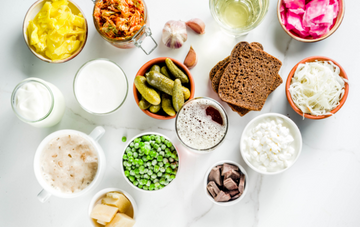
The Surprising Role of Probiotics in Gut Health
Probiotics and gut health have been a trending topic among many online health influencers and for good reason. With summer around the corner, many people are scrambling to get in shape. Whilst all of us want to look amazing on the outside, the key to feeling completely confident is ensuring we are healthy on the inside.
Your overall health and gut health are intimately connected. Whilst many of us know the basic principles of staying healthy, gut health is rarely a part of the conversation. This blog post will discuss the importance of probiotics in gut health and how they can aid in preventing and treating many diseases!
Astoundingly, our bodies comprise 37.2 trillion human cells and over 100 trillion bacteria cells that inhabit our guts. With this in mind, we must stop and consider the stunning question: who is actually running the show? The reality is that you are more of an ecosystem than an individual. Researchers have developed a far more profound understanding of the critical roles of the 100tn or so bugs we host. And, following decades of working out how to kill bacteria with soap and antibiotics, we are developing a more sensitive understanding of the symbiotic relationship we have with them.
The Importance of Probiotics and Bacteria
The bacteria we host in our digestive system are vital to our health. They help us break down the nutrients in our food, synthesise a range of vitamins, prime our immune systems to recognise bacterial, viral, and fungal enemies, and fight off food poisoning. They even produce neurotransmitter chemicals that influence our moods.
We can draw vital conclusions based on our knowledge. First, we know that a beneficial gut-bacteria profile is optimal for health, and we see different gut floras in ill people. So, it’s safe to associate good health with optimal gut bacteria. But, conversely, we can go a long way to prevent and treat premature ageing diseases.
Antibiotics kill Gut bacteria, and should you ever need to take these drugs, it is vital to take probiotic healthy gut bacteria supplements simultaneously and for some time after your antibiotic course has finished. I believe (based on a vast amount of research and observations of my patients) that it is crucial to take a probiotic every day. Before outlining my critical steps to a healthy gut, I want to preface it by saying that I don’t recommend commercially available probiotic drinks. Most of these are so full of sugar that they are intrinsically unhealthy and contribute to an undesirable gut bacteria profile known as ‘dysbiosis’.
Step one: Create a hospitable gut environment
Numerous foods contribute significantly to gut health and thus our overall wellbeing, mental health, emotional health, and physical health. So, first, it is imperative to ensure that your intestinal environment offers a safe and hospitable environment for healthy flora to flourish. You can achieve this by consuming foods which provide a food ‘substrate’ for beneficial gut bacteria: They like to ‘eat’ foods such as beans, inulin sources (e.g. Jerusalem artichoke, jicama, and chicory root), raw oats, unrefined wheat, unrefined barley, and yacon.
Step Two: Introduce those friendly bacteria
Eat and drink these for optimal gut (and all-round) health and wellbeing:
Kombucha
This fermented tea is jam-packed with beneficial bacteria. You can buy kombucha ready-made – but watch out for high sugar content, or you can buy a starter kit and make your own.
Fermented Vegetables
Sauerkraut and kimchi are both fermented with strains of beneficial lactic acid bacteria. As a bonus, many fermented vegetables have a longer shelf life than fresh ones.
Miso
This fermented soybean-based product is rich in probiotics, made with a “starter” of lactic acids.
Kefir
Kefir is like a form of yoghurt and is most often found commercially, made from milk. However, if you’re trying to avoid dairy (and there are a whole host of reasons as to why you should), you can get coconut-based kefirs – or you can even easily make your own. First, you have to buy the starter kit – a quick Google search will show you where to order this.
Pickles
As well as being delicious, pickles are also rich in probiotics. When making your pickles, use non-chlorinated water (boil the water first, then leave to cool). This is crucial, as chlorine will kill off the beneficial bacteria. Also, don’t forget to leave an inch of headspace at the top of the jar. This precaution allows for fermentation gases to escape.
So there you have it – some simple steps that you can take to improve your gut health and, by extension, your overall health. Give them a try, and if you have any questions, please visit my website for additional information.




Great tips. Another tip that I have taken up – I have a teaspoon of cider vinegar before I eat my main meal each evening.